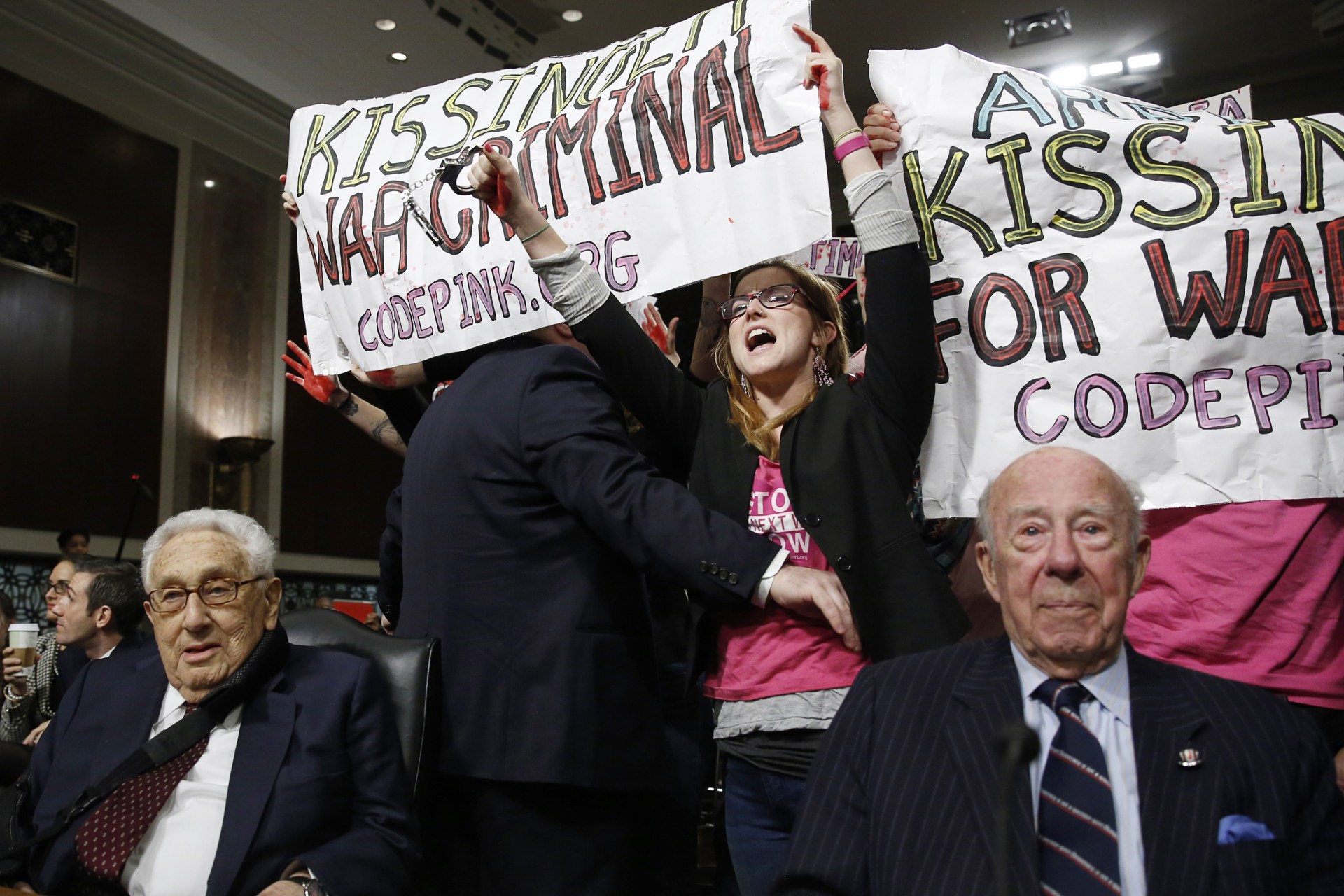Outrage Culture Is Ruining Foreign Policy
As the 2020 presidential campaign heats up, U.S. politics is getting harder and harder to explain to the rest of the world.

By experts and staff
- Updated
Experts
![]() By Steven A. CookEni Enrico Mattei Senior Fellow for Middle East and Africa Studies
By Steven A. CookEni Enrico Mattei Senior Fellow for Middle East and Africa Studies
This article was first published here on ForeignPolicy.com on January 20, 2020.
August and September 2018 were two significant months for the outrage culture that has afflicted the U.S. public square in recent years. In August, the California Democratic Party called for a boycott of In-N-Out Burger because of a $25,000 donation that company made to the state Republican Party. A few weeks later, some Americans burned their sneakers over a Nike television ad featuring the blackballed NFL quarterback Colin Kaepernick.
Ever since, I have wondered how foreign diplomats posted in Washington try to capture the current moment in U.S. politics. Do they and the foreign ministers, prime ministers, presidents, kings, and queens they serve grasp the near-constant state of indignation that has gripped society, fueling polarization and even fear in recent years? It seemed absurd to me that a beloved burger joint became the object of political ire among Democrats and that people, the majority of whom seemed to be supporters of President Donald Trump, were burning their sneakers. I cannot even imagine what those diplomatic cables say.
These episodes were no doubt regarded as the oddities and excesses of the current moment in American politics and may have been a source of confusion and dismay for U.S. allies, but the Kaepernick story and the burger boycott (which failed) had no effect on foreign policy. Yet this may be changing. In recent months, outrage—and its cousin, virtue signaling—have made it harder and harder to have a conversation about U.S. foreign policy. At a time when the world and U.S. priorities in it are changing, this sad state of affairs is putting Americans at a disadvantage.
There are already countries in the Middle East that elites in the United States tend to view through their own ideological prisms. As I wrote last summer: Egypt, Israel, the United Arab Emirates, and Saudi Arabia are “red” in the sense that Republicans tend to be—or are perceived to be—more supportive of these governments than Democrats. In turn, Iran, the 2015 nuclear deal, and Palestine are—or are perceived to be—“blue” given that Democrats tend to support engagement with the Iranians, back the nuclear agreement, and express sympathy with the Palestinians in greater numbers than Republicans. This state of affairs, I argued, was not a positive development. Looking back, I was a bit too Pollyannish for fear of giving offense—it is actually ludicrous, moronic, and dangerous.
In Washington these days there is no conversation or debate about foreign policy; there is only politics. The appreciation of a complex world in fine-grained shades of gray—the recognition of which once indicated an active and fertile mind—has given way to a binary world of absolutes. Folks choose teams and advocate for what is best for their side, not necessarily what is in the best interest of the United States. This seemed clear as the conversation— though it was more like people talking in their own echo chambers—about the U.S. killing of the Iranian general Qassem Suleimani unfolded. There was far greater interest among journalists, analysts, and activists in scoring points. That is how you get fury over a manufactured controversy in which Sen. Elizabeth Warren, a presidential candidate challenging Trump, allegedly changed her position on Suleimani’s demise. She did no such thing. I suppose that this type of nonsense is to be expected in a political campaign season, but it is precisely because the stakes in a confrontation with Iran are so high that the indignation and trolling were inappropriate.
There were a bevy of interesting analyses written over the last two weeks, but the overall quality of the discourse over the Suleimani hit was diminished by partisanship in which two basic facts seemed to get lost. First, Suleimani was the leader of the Quds Forces who had copious amounts of American, Syrian, and Iraqi blood on his hands, and he had devoted his violent life to doing the bidding of a regime built on a worldview that is hostile to the United States and American ideals. Second, killing Suleimani contained serious risks. Acknowledging the former should not qualify as support for the Trump administration, and recognizing the latter does not make one an apologist for Iran’s leaders. It should be ok to use the conjunction “but” or caveat a declaratory statement with a complicating factor. The world is maddeningly complicated (and interesting), and unless Americans can acknowledge that in their public discourse, they will have a foreign policy built on the defective assumptions of ideologues.
Of course, this politicization of foreign policy is not just a matter of the Suleimani killing, but it has reached new impassioned and frenzied heights. Since 2015, the editorial boards of both the Washington Post and the New York Times have inveighed against the Saudi intervention in Yemen at least 22 times. In these missives, the boards have called for a halt to military operations, demanded accountability for alleged war crimes, and beseeched both the Obama and Trump administrations to halt its logistical support for the Saudis and their partners.
In the abstract, these are reasonable demands, but the outrage shot through these editorials does little to help anyone understand the origins of the conflict or the nature of Saudi Arabia’s enemies in Yemen. The result is a narrative of bloodthirsty Saudis and innocent Houthis. Yemen is more complicated, of course. The Houthis are guided by the slogan, “God is Great, Death to America, Death to Israel, Curse the Jews, Victory to Islam,” which they seem to take seriously. They also believe that 9/11 was an American and Zionist plot to divide the Muslim world. The Houthis are not fighting because Saudi Arabia intervened in Yemen but rather because they are an actor in a civil war. There was one New York Times editorial on the Houthis. It was decidedly equivocal. This is not a defense of Saudi conduct in Yemen, which has been appalling, but rather to underscore the willful ignorance of outrage culture and how it obscures what is going on in a region that is important to the United States—at least for the time being.
There are a variety of compelling reasons to rethink the U.S.-Saudi relationship, but that is hard to do if one team believes that the Saudis are the root of all evil and the other is not willing to acknowledge there is a problem. It may very well be that smart individuals on both sides recognize the complexities and nuance of the Saudi issue but are constrained from publicly discussing them for fear of retribution and opprobrium from fellow team members. In other words, ideological purity tests. How did we get here? That is a rhetorical question. We all know how.
It is tempting to chalk it all up to the political silly season. Ahead of his run for the presidency in 1988, then-Vice President George H.W. Bush told Soviet leader Mikhail Gorbachev to ignore the “empty canons of rhetoric” that would mark the campaign, assuring his interlocutor that the bombast would recede once the votes were counted, a winner declared, and governing resumed. It is not so much that foreign policy was always insulated from politics, but it was often insulated from outrage. That no longer seems to be the case, and we are worse off for it.
